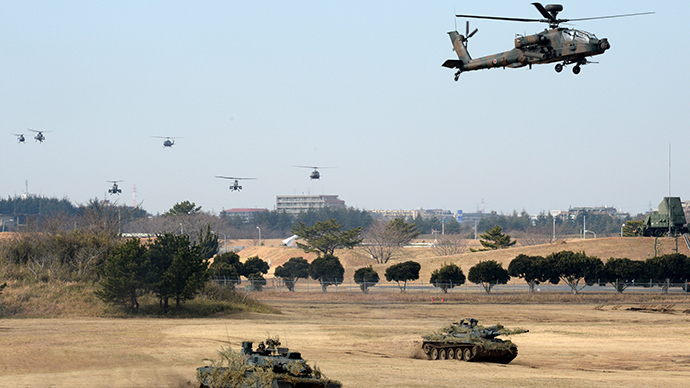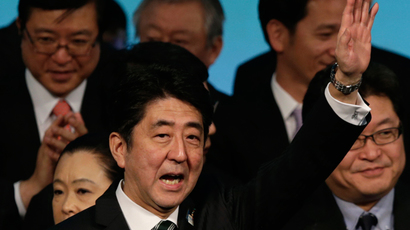Japanese citizen sues govt. over military expansion attempts

Tokyo has been handed a lawsuit seeking to block Prime Minister Shinzo Abe's move towards expanding the military. The case is the first of its kind and comes as the pacifist nation slides towards reinterpreting rules banning armed force.
“I hope other Japanese people will follow suit and file legal actions nationwide,” former civil servant Tokinao Chindo told AFP. He said that the military expansion was contrary to Japan’s war-renouncing constitution.
Mitsushige Yamanaka, mayor of Matsuzaka, has also indicated that he would be coordinating a movement with the aim of bringing a similar lawsuit against the central government.
Japan has banned the use of armed force except in extremely narrowly-defined circumstances.
The nation’s constitution renounces ‘the threat or use of force as means of settling international disputes.’ Abe had planned to change Article 9.
The change means that Japanese troops would be able to aid foreign countries – likely US allies – if they come under fire from a common enemy. Military action would be permitted even if Japan itself is not subject to immediate threat.
However, Abe was unable to secure the two thirds majority needed to pass the change through both houses, so he opted to reinterpret the document instead.
Abe confirmed a more liberal interpretation of the document on July 1. Under the new draft, the country’s Self-Defense Forces could respond to any perceived threats within Japan’s territorial land, sea and airspace. Article 9 limits Japan’s right to exercise collective self-defense.
Speaking at a press conference on the day of the new interpretation, Abe said the ‘basic idea’ of the constitution ‘remains unchanged,’ adding military involvement and action must be ‘minimal.’
The previous day, thousands gathered outside the Japanese prime minister's office to protest the changes, chanting “don’t destroy the Constitution.”
'Stop war': Thousands protest in Japan over military expansion law change

The move comes as the territorial dispute with China continues over islands in the South China Sea.
Seventy-five-year-old Chindo lived through the carnage of WWII as a child. “I want to pass on the message 'never wage war' to the next generation,” he told the agency.
“The Japanese shouldn't forget, just 69 years after the last war ended, that millions died during the war, and based on their sacrifices we embraced Article 9,” he added.
The pacifist stance ingrained in the constitution is deeply valuable for many Japanese people. However, recent polls have indicated that more than 50 percent of the country’s population favors a more aggressive military stance.
Chindo warned that increasing militarization could result in an arms race.
“There are already a number of nuclear weapons that can destroy the Earth many times over.”
At the end of June, a middle-aged man set himself on fire in the center of the Japanese capital in an apparent protest against the government’s plans to change Japan’s pacifist constitution.
He made a speech through a megaphone condemning Prime Minister Shinzo Abe’s plans to expand the use of the Japanese military by reforming the constitution.
Japanese man self-immolates in pro-pacifist constitution protest (GRAPHIC CONTENT)















